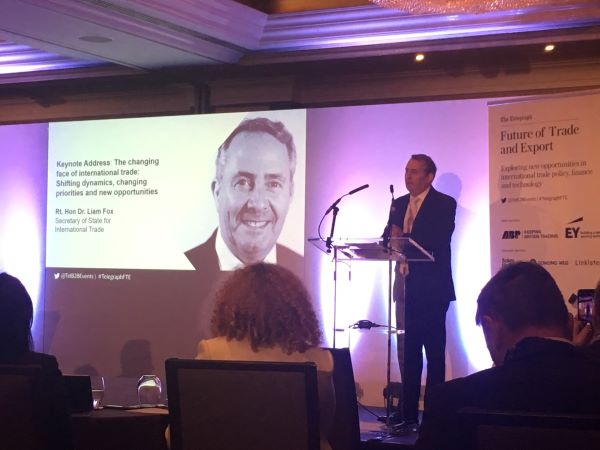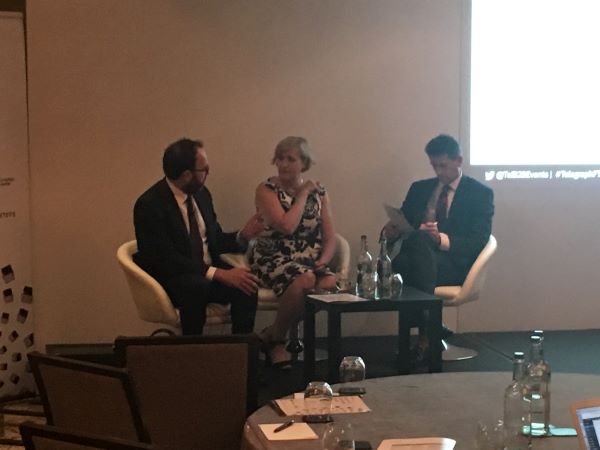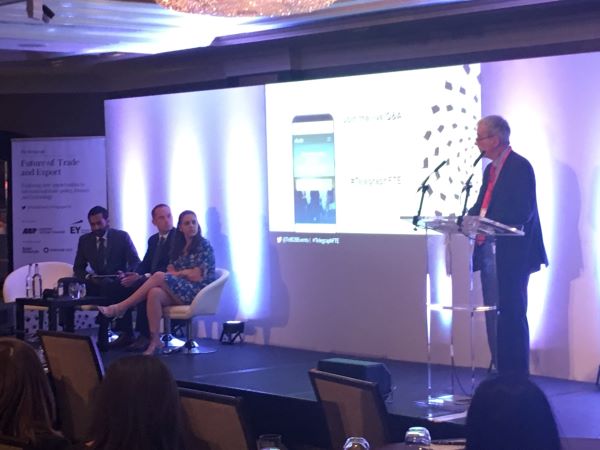
In an ideal world the UK would be planning ahead for the serious challenges and exciting opportunities that global trade faces in the coming decades. Our changing climate, the rise of technologies like blockchain and 3D printing, together with a new generation of talent coming through, should be at the top of all our agendas. Yet, even at The Telegraph’s ‘Future of Trade and Export’ event in London in June 2019, there was nothing quite like the present, as Brexit, the recent rise of protectionism and the current threats to the multilateral trading system dominated discussion.
The event sought to explore ‘new opportunities in international trade policy, finance and technology’ but it was apparent throughout the conference that the immediate reality of the UK’s protracted withdrawal from the EU needs to be resolved before the UK could truly focus on the challenges ahead.
Opportunities in Crises
Chris Southworth, Secretary General of the International Chamber of Commerce UK, who chaired the event, did suggest that the Brexit saga could present the UK some opportunities to take the lead in some key areas of global trade. For instance, on a panel discussion chaired by the Institute’s Chairman, Terry Scuoler, he argued that if the UK were to find a way to enable frictionless trade over the Irish border using cutting-edge technologies, it would then be in a prime position to lead a reinvention of how goods are traded over borders around the world.
On the same panel, David Leighton, Group Head of Corporate Affairs and Marketing at Associated British Ports, suggested that the UK needs to take a more confident and solutions-focussed approach to Brexit. Pauline Bastidon, Head of European Policy at the Freight Transport Association, did, however, warn that there will always be a need for people with skills and knowledge around customs processes, whatever the technologies used to facilitate cross-border trade.
The IOE&IT makes it case
Alongside Terry, the Institute were also represented by Lesley Batchelor OBE (our Director General) and Roger Arthey (Chair of the Export Control Profession Board). Lesley’s session addressed the customs challenges that UK businesses face because of Brexit and she warned that there are too many businesses who have not yet taken the steps needed to prepare for it. She did, however, advise delegates that businesses have been exporting beyond the EU for decades and that the UK traded with Europe long before the EU was set up. Exporting will continue to be perfectly doable and profitable, whatever happens with Brexit, but businesses and individuals need to learn how it’s done to do it properly.

Roger chaired an afternoon panel addressing the changing regulatory framework of international trade, particularly around Export Controls. He was joined by Allie Renison (Head of Europe and Trade Policy – Institute of Directors), Adam Scragg (Trade & Export Controls Operational Specialist, Group Ethics & Compliance – Johnson Matthey) and Sunny Mann (Partner – Baker McKenzie).
The panel spoke of how a rise in the use of economic measures for political retaliation – including Western sanctions on Russia and Iran – will continue to impact businesses’ ability to trade internationally. They advised that businesses need to stay abreast of ‘economic attacks’ around the world – including measures also taken by non-Western governments, like the Gulf Nations’ use of sanctions against Qatar. They also warned that SMEs will continue to be hardest hit by these interventions due to their lack of resource to track what’s happening and to complete the necessary documentation and processes for compliance with the resultant regulations.
Roger introduced the IOE&IT’s new Export Control Profession as part of the panel, suggesting that it could be a valuable resource for raising awareness and knowledge across the business community about these issues.

Preserving the multilateral trading system must be a priority
One of the other major themes of the conference was the repeated call to preserve the multilateral trading system that exists through the rules that are set and maintained by the World Trade Organisation (WTO). Alan Wolff, Deputy Director General of the WTO, spoke about how gaps in the rules governing world trade – including the current Irish border question and the need for clearer rules over trade in services and through ecommerce – need to be addressed through a reformist, rather than a revolutionist, approach.
Dr Liam Fox, Secretary of State for the Department for International Trade (DIT), also gave a keynote speech endorsing the value of free trade, arguing that global trade has bought a billion people out of abject poverty in the last three decades. He warned that the dangers of protectionism need to be addressed, pointing out that in 2018 there were 1,200 non-tariff barriers to trade being enforced by G7 and G20 nations compared to 300 in 2010.
He argued for the UK to continue to be an advocate of free trade post-Brexit, pitching for the government to invest more strongly in the DIT. He argued that “Global Britain cannot be built on a shoestring”.
Brexit needs to be put in perspective
Brexit was of course a key talking point throughout the conference, but many speakers were keen to point out that there are several more pressing issues in global trade, when a more global outlook is taken. Multiple speakers argued that the US-China trade war is more systemic in nature and more potentially damaging. It was also pointed out that the WTO appellate body continues to face an existential threat, with the USA refusing to approve new appointments to it.
However, in terms of policy matters for the future of trade, technological advancements and the impact of climate change were given prior importance. Mats Persson, Head of International Trade, Economics and Policy Unit at EY (UK & Ireland), argued that the top 5 trends changing global trade are:
- changing consumer behaviours;
- upcoming market saturation points for technologies including blockchain, AI and 3D printing;
- the increasing importance and connectivity of data;
- changing trade lanes (including new trade agreements, trade infrastructure projects and varying tariffs);
- and regulatory interventions.
He argued that businesses need to ensure they remain competitive by anticipating the regulatory interventions that reinforce emerging consumer trends – particularly around climate and technology. He noted that phenomena such as the ‘Greta Thunberg effect’ are already changing business practices and laws.
Britain needs to readjust to its new position and get ahead on the issues that matter
The chair for the conference, Chris Southworth, controversially suggested that the UK would need to adjust to becoming a ‘second tier’ trading nation after Brexit, suggesting that it won’t have the same leverage as the USA, China and the EU. He argued that for the UK to maintain influence in the global trade arena, it’s businesses and government need to collaborate more effectively to ensure its voice is heard on vital trade policies to do with climate, technology and free trade.
While the UK’s exact position in the future trade landscape was a point of debate, there was a consensus that the UK will have an opportunity and responsibility to support the rules-based global trade order and to push for progressive trade policies on the matters that will affect all nations in the years to come.



